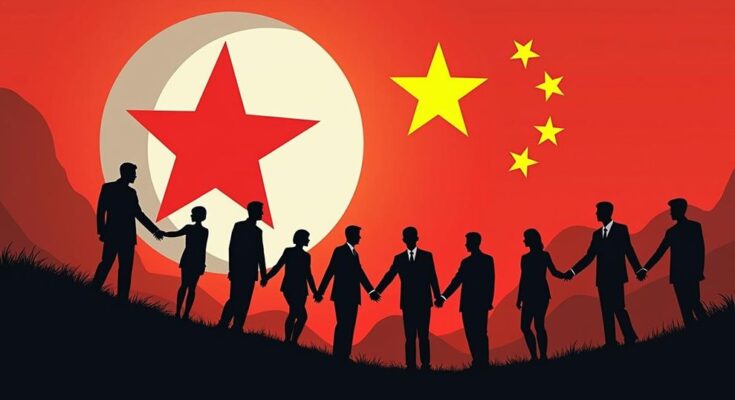North Korea and China celebrated the 75th anniversary of their diplomatic ties with messages advocating for enhanced cooperation, amidst inquiries regarding their partnership, particularly given North Korea’s increasing collaboration with Russia. Kim Jong Un and President Xi Jinping emphasized commitment to strengthening bilateral relations, even as their alliance’s dynamics remain scrutinized by external observers.
On Sunday, October 6, 2024, North Korea and China commemorated the 75th anniversary of their diplomatic relations, exchanging messages that underscored a desire for enhanced cooperation amid external skepticism regarding the nature of their partnership. Amidst growing collaboration between North Korea and Russia, experts are monitoring future interactions between Pyongyang and Beijing to decipher the true dynamics of their relationship. North Korean leader Kim Jong Un conveyed to Chinese President Xi Jinping a commitment to “steadily strive to consolidate and develop the friendly and cooperative relations” between their countries, as reported by North Korea’s official Korean Central News Agency (KCNA). In reciprocation, President Xi expressed that China is prepared to work together to promote the stability of the socialist causes within both nations, according to KCNA. Historically, since their formal establishment of diplomatic ties in 1949, North Korea and China have maintained a connection often described as “as close as lips and teeth.” China, being North Korea’s largest trading ally and primary aid supplier, has faced scrutiny regarding its adherence to United Nations sanctions against North Korea, with allegations of secretive aid shipments to support its neighbor. Despite this, analysts note that China is hesitant to engage in a trilateral alliance with North Korea and Russia, prioritizing a stable security environment over potentially volatile engagements, particularly in light of its economic relations with Europe and other Asian nations. The camaraderie between North Korea and Russia has deepened, particularly following accusations that North Korea has provided conventional military assistance to Russia amidst its ongoing conflict in Ukraine, supposedly in exchange for military support. A pivotal agreement between Kim and Russian President Vladimir Putin in June to offer mutual military assistance in cases of conflict marks a significant defense accord, the most substantial since the Cold War. Currently, North Korea remains embroiled in escalating tensions with the United States, South Korea, and allied nations regarding its advancing nuclear program. Recently, Kim Jong Un supervised a military training exercise, emphasizing the need for a focus on guerrilla tactics to effectively counter perceived threats. As geopolitical tensions evolve, the future of North Korea-Chinese relations remains critical, with many observers anticipating that forthcoming official exchanges will illuminate the true state of their alliance.
North Korea and China established diplomatic relations on October 6, 1949, creating a partnership characterized by mutual support and economic interdependence. Over the decades, this alliance has been tested by various geopolitical dynamics, including North Korea’s nuclear ambitions and its relationships with other global powers such as Russia and the United States. China’s role as North Korea’s chief trading partner and aid provider has prompted scrutiny regarding its compliance with international sanctions aimed at curtailing North Korea’s military programs. Furthermore, as both nations navigate their respective challenges, particularly China’s preference for regional stability and North Korea’s need for military support, the evolution of their relationship is closely monitored by international observers.
The 75th anniversary of North Korea and China’s diplomatic relations signals a potentially pivotal moment in their partnership amid shifting geopolitical landscapes. While the leadership in both countries has expressed a desire for stronger ties, the implications of North Korea’s growing cooperation with Russia and ongoing tensions with the United States will significantly influence the future dynamics between Pyongyang and Beijing. Continued observation of forthcoming diplomatic engagements will be essential to understanding the depth and stability of this longstanding relationship.
Original Source: www.ksat.com




